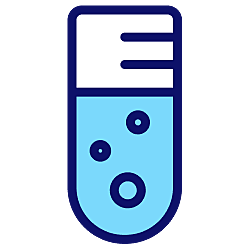Fertility Tests for Women
Our helpful guide details different types of fertility tests you can do at home. Read on to find out what each fertility test shows you and which one might be best for you. Request a test online today with the advice of our trusted ZAVA doctors. Get your results within days and learn what your next step should be.
Prices from £5.00
Simply fill in a brief consultation questionnaire and one of our doctors will review your request today.
You can request a fertility test from ZAVA, from the comfort of your own home. There are many fertility tests to choose from. In this guide, we explain what’s available and what you can find out from your fertility test results.
Here are the 4 main tests that are available:
- progesterone test, to check if you have released an egg during your menstrual cycle
- anti-mullerian hormone (AMH) test, to check whether the number of eggs you have is normal for your age
- pituitary hormones test, to check if you are releasing certain hormones required for fertility and if your ovaries are working as they should
- polycystic ovary syndrome (PCOS) test, to check if you have a condition that may be affecting the release of your eggs
You can also select our fertility consultation service to find the right test for you. If you are recommended a test kit in your consultation, you will receive a £5 discount when you purchase it.

In stock. Prices from £5.00
In stock. Prices from £69.00
In stock. Prices from £35.00

In stock. Prices from £105.00

In stock. Prices from £105.00
In stock. Prices from £105.00

No results found.
Please check your spelling or try another treatment name.



About female fertility tests
-
-
A fertility test is a way for you to find out how easily you can get pregnant. There are different ways to measure fertility, so you can choose a test that pinpoints what you want to find out about your fertility.
For example, you may want to have a fertility test that tells you whether you’re still ovulating if you’d like to try and have a baby. This fertility test is a progesterone test and it works best when you do it 7 days before your next period is due. It’s easier to do a progesterone test if your periods are regular so you can accurately time when to do it.
Another type of test is an AMH (anti-mullerian hormone) test that can tell you the level of AMH in your blood and provide an indication of your remaining egg supply. The number of eggs you have is also known as your ovarian reserve. You can do an AMH test at any time during your menstrual cycle, and it can be a helpful fertility test to do if you are considering IVF treatment or freezing your eggs for future use.
If you have irregular periods, a PCOS test will have a look at your testosterone levels, SHBG (sex hormone binding globulin) levels and free androgen index (FAI). Having PCOS might make it harder to get pregnant naturally, so knowing you have it will help you make future decisions on the best way to get pregnant.
You may want to do a pituitary hormones test, that looks at how much FSH (follicle stimulating hormone), TSH (thyroid stimulating hormone) and prolactin you are producing. This can help you find out if there are other factors that may be affecting your fertility.
-
-
Fertility testing works by looking at different types of substances, such as hormones, that your body produces during your menstrual cycle.
When you do a fertility test you have to collect a small blood sample using a finger prick, so it’s quick and you can do it at home. Your blood sample then goes to one of our trusted medical labs. There, they find out how much of that substance was in your body at the time you took the test.
The accuracy of the test depends on you taking the test at the right time during your menstrual cycle. The pituitary and progesterone tests need to be taken on specific days of your menstrual cycle, so you will need to follow the guidance provided by our doctor when you order them. The PCOS and AMH tests can be taken on any day of the month. The good news is that you can take them more than once if you need to.
Your results are then sent from the lab to a doctor at ZAVA who will check what the numbers mean for your fertility. The whole process takes a few days and you’ll get your results in a way that is easy for you to understand through your ZAVA patient account.
The 4 tests that are available, check for these hormones:
- progesterone test, checks for your levels of progesterone
- anti mullerian hormone (AMH) test, checks for your levels of AMH
- pituitary hormones test, checks for FSH, TSH, and prolactin
- polycystic ovary syndrome (PCOS) test, checks for testosterone, SHBG and FAI
-
-
You may be infertile if you’ve been trying to have a baby for 1 year and you’ve been unable to get pregnant. As a female, the older you get, the more difficult it will be to get pregnant naturally.
The signs of female infertility include:
- not having a period for a long time
- starting menopause early
- having certain medical conditions, such as PCOS
- fertility tests that show you are not producing the required hormones to successfully get pregnant
- fertility tests that show you are not releasing eggs from your ovaries
You may want to have a fertility test if you:
- are 35 or under and have been trying to get pregnant for 1 year or more
- are over 36 years old and have been trying to get pregnant for 6 months or more
- have recently had cancer treatment
- have found it difficult to get pregnant in the past
- have irregular periods
- take other medicines that may affect your fertility
- smoke regularly
- drink a lot of alcohol
- are stressed
- are overweight
To increase your chances of getting pregnant, you can have sex every 2 to 3 days. If you find sex painful or are unable to have sex this often, you should speak to a doctor about having a sexual health check.
-
-
Tests
The tests available for infertility include:
- a doctor checking your pelvic area for any signs of swelling (inflammation), lumps or pain
- getting a swab test to check if you have an infection, such as chlamydia or gonorrhoea
- imaging scans which look for pelvic inflammatory disease, fibroids, endometriosis, or tumours on your ovaries, such as an ultrasound or MRI
There are also blood tests you can do to check your fertility at home, such as:
- progesterone test
- anti-mullerian hormone (AMH) test
- pituitary hormones test
- polycystic ovary syndrome (PCOS) test
You can fill out a free online form with ZAVA, to see which fertility test is right for you.
Further tests
There are further tests that can help you find out the cause of infertility, and they can involve getting tests for a male partner.
For example, you may want to request a test for male sperm analysis to check the quality of the sperm.
You and your partner may want to have an overall health check and look at what lifestyle changes you may need to make to increase your chances of getting pregnant.
A doctor may check your blood pressure, the levels of cholesterol in your blood and your body weight. You may need to do other types of blood tests to check for different hormones or any vitamins that you may not be getting enough of.
Seeing a doctor that specialises in fertility treatments is another step that you can invest in to get pregnant.
Assisted conception
Assisted conception is a type of treatment for infertility. These methods get around any problems with egg quality, release or fertilisation.
Here are a few types of assisted conception that you may want to consider:
- intrauterine insemination (IUI): where you have sperm put into your womb, without having sex, to fertilise an egg
- in vitro fertilisation (IVF): where you are given medicines to help you release an egg or they are directly extracted from your ovaries, then the egg is fertilised with sperm outside of your body and implanted into your womb
- donor egg or sperm: where another person provides you with an egg or sperm to help you get pregnant
- surrogate mother: where another person carries your baby for you and gives birth to the baby
-
-
Fertility treatment is more effective when you:
- are less than 35 years old
- have high quality eggs
- have eggs that are younger than your current age, such as eggs that you may have extracted and had frozen earlier in your life, or a donor egg from a young person
- have more eggs
- respond to the medicines they use during the treatment
Your fertility treatment can be affected by your lifestyle factors too, so to make it more effective you can:
- quit smoking
- avoid drinking alcohol
- keep physically fit by exercising regularly
- eat well to maintain a healthy weight
- lose weight if you need to
Your chances of effective fertility treatment are lower if you:
- are over 42 years old
- have certain medical conditions that affect a fertilised egg from implanting and growing into a baby
- are unable to carry a developing baby as your body cannot produce the right natural hormones or substances to support the pregnancy
- have recently had chemotherapy or take medicines that can affect getting pregnant
-
-
The main causes of female infertility include:
- polycystic ovary syndrome (PCOS), which can affect your hormone levels and cause irregular periods
- having a low body weight or low body fat percentage
- having a high body weight or high body fat percentage
- your pituitary gland producing too much prolactin, which lowers how much oestrogen you can produce
- certain medication that might be affecting the levels of hormones in your body
- pelvic inflammatory disease, where your uterus or fallopian tubes are infected or have been damaged by sexually transmitted infections (STIs), such as chlamydia or gonorrhoea
- if you’ve had surgery to remove your uterus or ovaries, such as a hysterectomy
- if you’ve have chemotherapy or radiotherapy to treat cancer or other conditions
- being born with a uterus that is too small or an unusual shape
- having a cervix that is too narrow, so sperm find it difficult to get through and enter your womb (uterus) to fertilise an egg
- growths caused by endometriosis, or polyps or fibroids that may affect an egg being fertilised by sperm or the implantation of a fertilised egg
- having a problem with your immune system, where it causes damage to your uterus, ovaries, pituitary gland or hypothalamus in the brain
- not releasing an egg regularly (every month)
- damage to any part of your reproductive organs
- low quality egg cells
-
-
You can boost your fertility by:
- eating a healthy diet each day which mainly includes natural foods
- exercising around 5 times per week for at least 30 minutes each time
- sleeping well, for around 8 hours a day
- reducing your stress levels
- you and your partner quitting smoking
- losing or gaining weight if you need to, so your body weight is between 20 to 25 on the body mass index (BMI) scale
- having sex in the middle of your cycle (around 12 days since the first day of your period) without using contraception (such as the pill or condoms)
- cut out or cut down on how much alcohol you and your partner drink by sticking to 1 or 2 units of alcohol each week
- checking with your doctor if any medicines you take or any treatments you’re having may affect your chances of getting pregnant
If you are trying for a baby, make sure you take 400 micrograms of folic acid (vitamin B9) every day and continue to take it even after you get pregnant. Taking folic acid helps your baby develop a healthy nervous system and prevents a harmful condition called spina bifida.
You may need to take more than 400 micrograms (up to 5mg) per day of folic acid depending on:
- the current state of your health
- what you regularly eat on a day to day basis
- if you take other medication
If you are unsure how much folic acid you need to take, start with taking 400 micrograms each day and speak to a doctor as soon as you can to see if you need to take more.
-
-
If your periods stop before you become 45 years old, this is considered an early menopause.
Causes of early menopause include:
- when your ovaries stop producing oestrogen
- faulty genes that you are born with (chromosome abnormalities)
- your own immune system damaging your ovaries (autoimmune disease)
- a side effect from medication, chemotherapy or radiotherapy
- damage to your body from an infection you’ve had in the past, such as tuberculosis, malaria or mumps
- having surgery to remove your ovaries, for example due to cysts or cancer
The symptoms of menopause symptoms you might experience include:
- no, or infrequent, periods
- having a sore, itchy or dry vagina
- suddenly feeling hot (hot flushes)
- sweating at night while you’re asleep
- finding it difficult to sleep
- changes in your mood or feeling down
- finding it difficult to concentrate or remember things
- not wanting to have sex as much as you used to
You can treat these menopause symptoms using hormone replacement therapy (HRT), which replaces the hormone (oestrogen) that you no longer produce. HRT treatments for menopause include:
- patches, such as Evorel
- creams, such as Ovestin
- tablets that you swallow, such as Kliofem
- tablets that you put into your vagina (pessary), such as Vagifem
If your periods have started becoming lighter or completely stopped for the past 6 to 12 months, speak to a doctor about whether you could have started your menopause early.

Dr Babak Ashrafi Clinical Lead for Service Expansion
Accreditations: BSc, MBBS, MRCGP (2008)
Babak studied medicine at King’s College London and graduated in 2003, having also gained a bachelor’s degree in Physiology during his time there. He completed his general practice (GP) training in East London, where he worked for a number of years as a partner at a large inner-city GP practice. He completed the Royal College of GPs membership exam in 2007.
Meet our doctorsLast reviewed: 27 Jan 2022
-
Early menopause NHS [accesssed Dec 2021]
-
Overview NHS Infertility [accesssed Dec 2021]
-
Female infertility, Bupa [accessed Dec 2021]
-
Age and fertility, Reproductive Facts [accessed Dec 2021]








